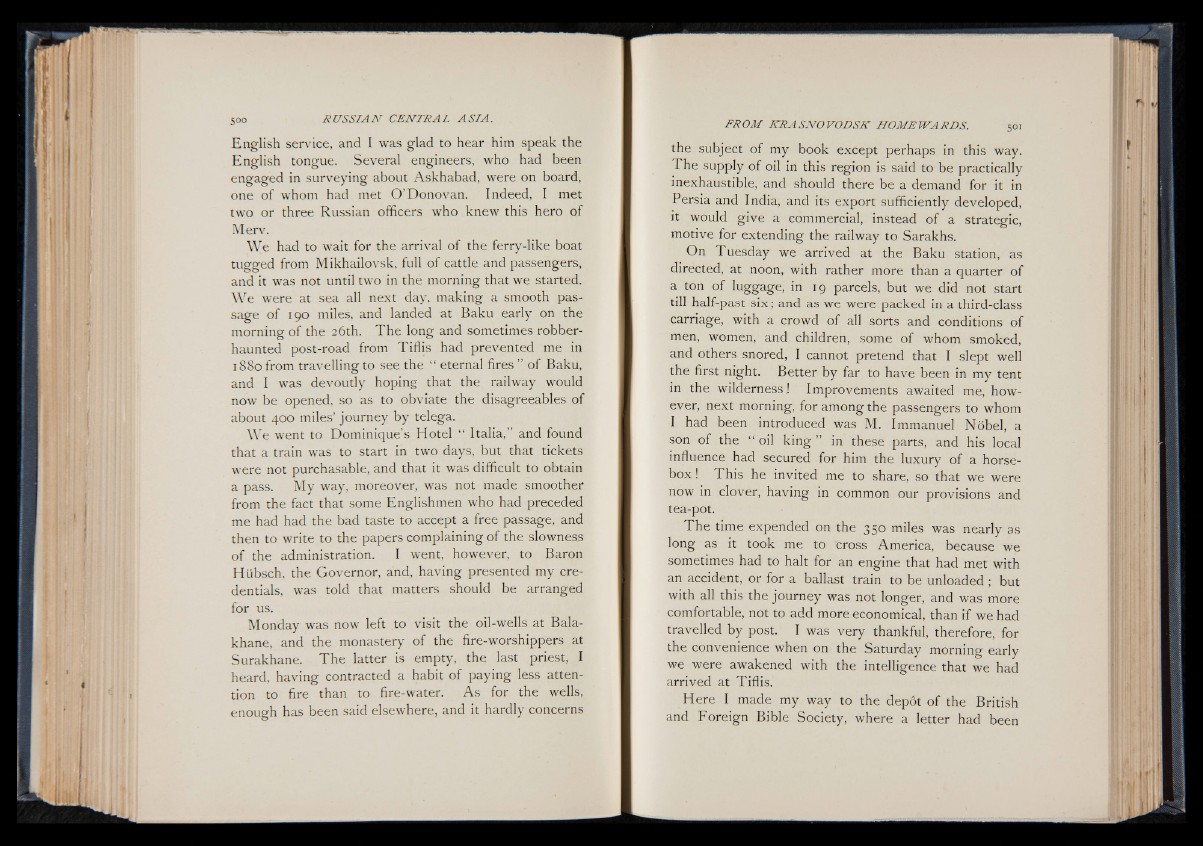
English service, and I was glad to hear him speak the
English tongue. Several engineers, who had been
engaged in surveying about Askhabad, were on board,
one of whom had met O ’Donovan. Indeed, I met
two or three Russian officers who knew this hero of
Merv.
We had to wait for the arrival of the ferry-like boat
tugged from Mikhailovsk, full of cattle and passengers,
and it was not until two in the morning that we started.
W e were at sea all next day, making a smooth passage
of 190 miles, and landed at Baku early on the
morning of the 26th. The long and sometimes robber-
haunted post-road from Tiflis had prevented me in
1880 from travelling to see the “ eternal fires ” of Baku,
and I was devoutly hoping that the railway would
now be opened, so as to obviate the disagreeables of
about 400 miles’ journey by telega.
We went to Dominique’s Hotel “ Italia,” and found
that a train was to start in two days, but that tickets
were not purchasable, and that it was difficult to obtain
a pass. My way, moreover, was not made smoother
from the fact that some Englishmen who had preceded
me had had the bad taste to accept a free passage, and
then to write to the papers complaining o f the slowness
of the administration. I went, however, to Baron
Hübsch, the Governor, and, having presented my credentials,
was told that matters should be arranged
for us.
Monday was now left to visit the oil-wells at Bala-
khane, and the monastery of the fire-worshippers at
Surakhane. The latter is empty, the last priest, I
heard, having contracted a habit of paying less attention
to fire than to fire-water. A s for the wells,
enough has been said elsewhere, and it hardly concerns
the subject of my book except perhaps in this way.
The supply of oil in this region is said to be practically
inexhaustible, and should there be a demand for it in
Persia and India, and its export sufficiently developed,
it would give a commercial, instead of a strategic,
motive for extending the railway to Sarakhs.
On Tuesday we arrived at the Baku station, as
directed, at noon, with rather more than a quarter of
a ton of luggage, in 19 parcels, but we did not start
till half-past six ; and as we were packed in a third-class
carriage, with a crowd of all sorts and conditions of
men, women, and children, some of whom smoked,
and others snored, I cannot pretend that I slept well
the first night. Better by far to have been in my tent
in the wilderness! Improvements awaited me, however,
next morning, for among the passengers to whom
I had been introduced was M. Immanuel Nobel, a
son of the “ oil king ” in these parts, and his local
influencé had secured for him the luxury of a horsebox
! This he invited me to share, so that we were
now in clover, having in common our provisions and
tea-pot.
The time expended on the 350 miles was nearly as
long as it took me to cross America, because we
sometimes had to halt for an engine that had met with
an accident, or for a ballast train to be unloaded ; but
with all this the journey was not longer, and was more
comfortable, not to add more economical, than if we had
travelled by post. I was very thankful, therefore, for
the convenience when on the Saturday morning early
we were awakened with the intelligence that we had
arrived at Tiflis.
Here I made my way to the dépôt of the British
and Foreign Bible Society, where a letter had been